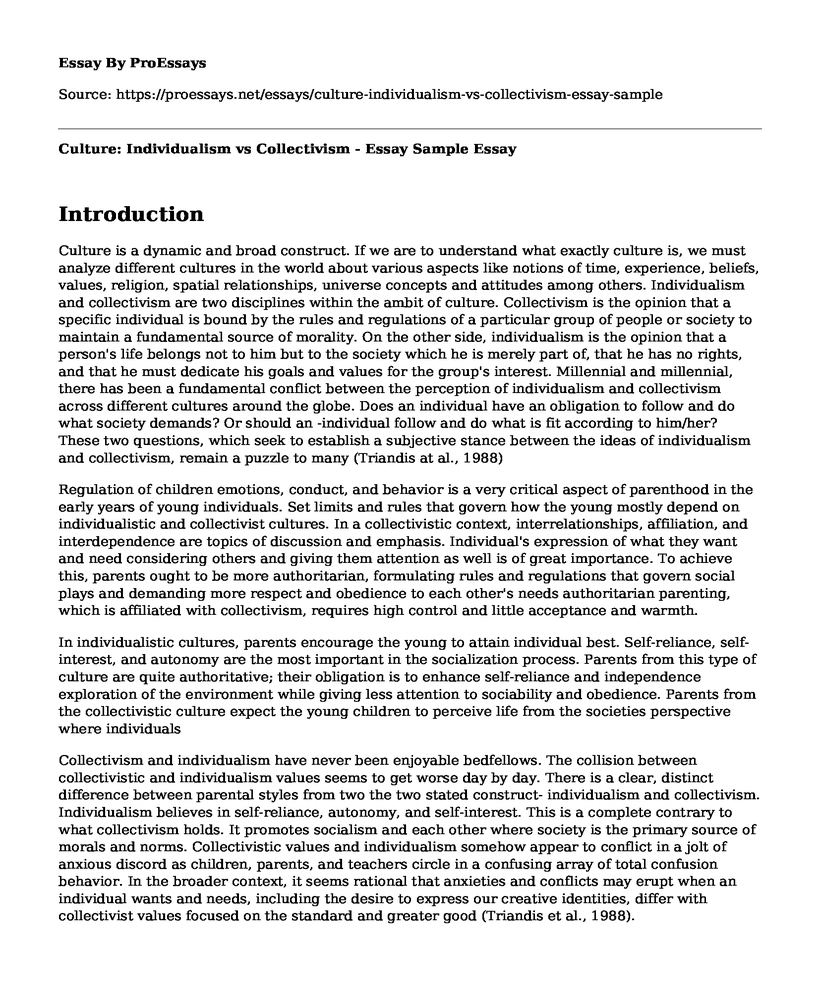Introduction
Culture is a dynamic and broad construct. If we are to understand what exactly culture is, we must analyze different cultures in the world about various aspects like notions of time, experience, beliefs, values, religion, spatial relationships, universe concepts and attitudes among others. Individualism and collectivism are two disciplines within the ambit of culture. Collectivism is the opinion that a specific individual is bound by the rules and regulations of a particular group of people or society to maintain a fundamental source of morality. On the other side, individualism is the opinion that a person's life belongs not to him but to the society which he is merely part of, that he has no rights, and that he must dedicate his goals and values for the group's interest. Millennial and millennial, there has been a fundamental conflict between the perception of individualism and collectivism across different cultures around the globe. Does an individual have an obligation to follow and do what society demands? Or should an -individual follow and do what is fit according to him/her? These two questions, which seek to establish a subjective stance between the ideas of individualism and collectivism, remain a puzzle to many (Triandis at al., 1988)
Regulation of children emotions, conduct, and behavior is a very critical aspect of parenthood in the early years of young individuals. Set limits and rules that govern how the young mostly depend on individualistic and collectivist cultures. In a collectivistic context, interrelationships, affiliation, and interdependence are topics of discussion and emphasis. Individual's expression of what they want and need considering others and giving them attention as well is of great importance. To achieve this, parents ought to be more authoritarian, formulating rules and regulations that govern social plays and demanding more respect and obedience to each other's needs authoritarian parenting, which is affiliated with collectivism, requires high control and little acceptance and warmth.
In individualistic cultures, parents encourage the young to attain individual best. Self-reliance, self-interest, and autonomy are the most important in the socialization process. Parents from this type of culture are quite authoritative; their obligation is to enhance self-reliance and independence exploration of the environment while giving less attention to sociability and obedience. Parents from the collectivistic culture expect the young children to perceive life from the societies perspective where individuals
Collectivism and individualism have never been enjoyable bedfellows. The collision between collectivistic and individualism values seems to get worse day by day. There is a clear, distinct difference between parental styles from two the two stated construct- individualism and collectivism. Individualism believes in self-reliance, autonomy, and self-interest. This is a complete contrary to what collectivism holds. It promotes socialism and each other where society is the primary source of morals and norms. Collectivistic values and individualism somehow appear to conflict in a jolt of anxious discord as children, parents, and teachers circle in a confusing array of total confusion behavior. In the broader context, it seems rational that anxieties and conflicts may erupt when an individual wants and needs, including the desire to express our creative identities, differ with collectivist values focused on the standard and greater good (Triandis et al., 1988).
Changing culture is hard, consciously since, cultural stereotypes exhibit high resistance to change and their redefinition. Culture mostly seems inflexible to the holder at any one point in time due to cultural alterations arise incrementally. Cultural alteration is quite a progression. Policymakers are expected to make tremendous efforts in order to improve some essential society aspects.
References
Triandis, H. C., Bontempo, R., Villareal, M. J., Asai, M., & Lucca, N. (1988). Individualism and collectivism: Cross-cultural perspectives on self-ingroup relationships. Journal of personality and Social Psychology, 54(2), 323. Doi: org/10.1037/0022-3514.54.2.323
Cite this page
Culture: Individualism vs Collectivism - Essay Sample. (2023, Jan 16). Retrieved from https://proessays.net/essays/culture-individualism-vs-collectivism-essay-sample
If you are the original author of this essay and no longer wish to have it published on the ProEssays website, please click below to request its removal:
- Child Crisis Arizona: Speech
- Global Money Can Not Buy Happiness - Essay Sample
- Essay Sample on Use of Native American Team Mascots
- Essay Sample on Learning Styles and Personality Type
- Essay Sample on How Anxiety Disorders Affect Academic Performance
- Essay on a Transition Plan for Robert: A Community Correctional Assessment
- Essay Example on Jamaica's National Motto: Out of Many, One People







